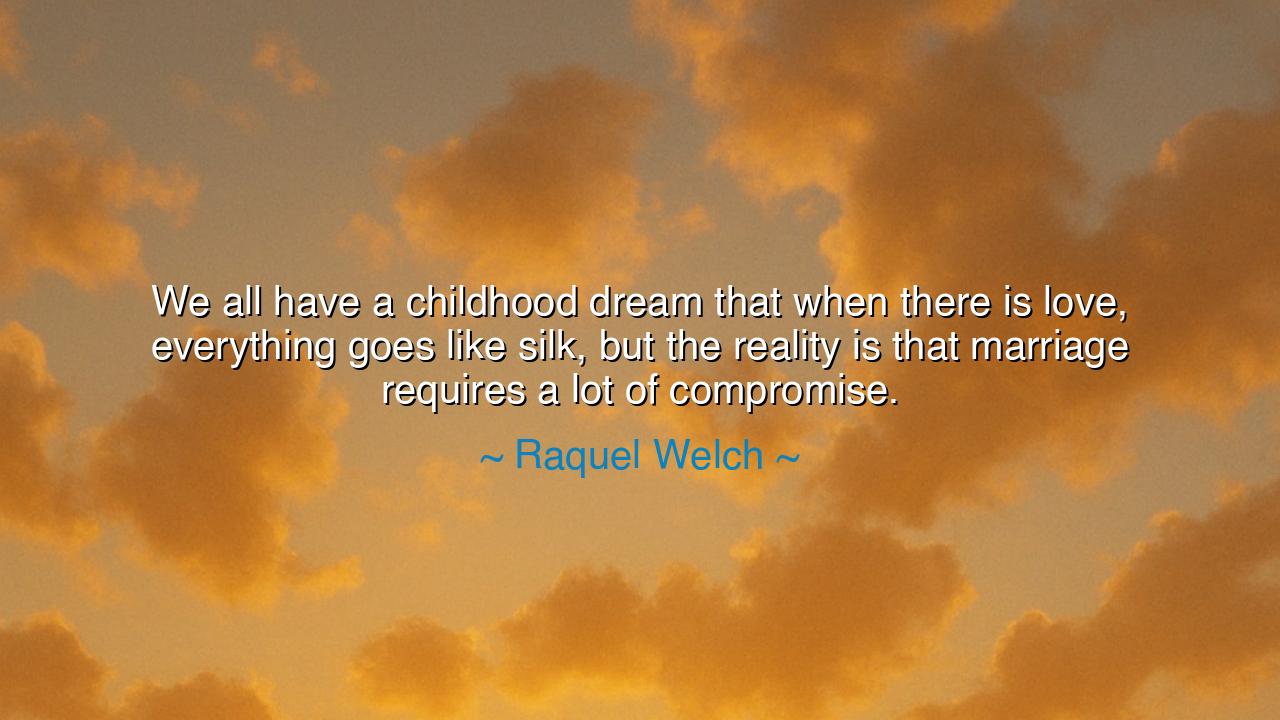
We all have a childhood dream that when there is love, everything
We all have a childhood dream that when there is love, everything goes like silk, but the reality is that marriage requires a lot of compromise.






O children of the future, gather closely, for the words I bring you today are filled with the deep wisdom of Raquel Welch, a woman whose reflections on love and marriage speak to the heart of human experience. She once said, "We all have a childhood dream that when there is love, everything goes like silk, but the reality is that marriage requires a lot of compromise." These words resonate deeply because they touch on a truth that transcends time, a truth that all those who have entered the bond of marriage understand: love is not always as effortless as we dream it to be.
As children, we imagine that love is a fairy tale, a perfect harmony where two souls unite and glide through life unscathed by hardship or misunderstanding. This dream is nourished by the stories we hear, the songs we sing, and the very essence of innocence. Marriage, in this idealized vision, is a dance of joy, where all differences melt away, where all conflict is resolved with a smile and a gentle touch. But as the years pass and we step into the reality of marriage, we discover that the bond we share with another is not only forged in moments of bliss but also through the difficult work of navigating differences, of finding common ground, and of learning to compromise.
Let us look to the story of the ancient Greeks, whose understanding of marriage was rooted not in the notion of perfect love, but in the idea of shared responsibility. In their eyes, marriage was a union of souls—yes—but it was also a practical partnership, a means of ensuring the stability of the family and the future of the community. Even in the grandest myths, love was rarely portrayed as a smooth, uninterrupted path. Consider the tale of Odysseus and his wife, Penelope, whose love was tested by long years of separation. Though their bond was deep, it was not without struggle, and it was through patience, compromise, and mutual respect that their marriage endured. Penelope, though ever faithful, had to endure many challenges, from the suitors who sought her hand to the distance that separated her from her husband. Her ability to compromise, to live with uncertainty, was key to their eventual reunion.
This ancient wisdom, O children, reminds us that love alone does not carry us through the trials of marriage. While love may ignite the flame, it is compromise that keeps it burning through the storms of life. The reality of marriage is that it is a continual balancing act, a give-and-take that requires each person to put aside their own desires at times for the greater good of the union. It is not the pursuit of perfection but the shared commitment to navigate the imperfect that holds two souls together.
Consider also the tale of Queen Victoria and Prince Albert, whose union has been celebrated as one of enduring love, yet their marriage was not without its challenges. Despite their affection for one another, their relationship was marked by moments of tension, as Victoria, a strong-willed queen, had to learn to compromise with Albert, her consort. The very nature of their positions required that they work together in the governance of an empire, and their personal relationship had to adapt to the pressures of public duty. Compromise—in the form of shared responsibilities, mutual understanding, and the willingness to put the needs of the realm above personal desires—was essential to their success. Their love was tested not by lack of affection, but by the demands of leadership, illustrating that marriage, even when built on deep love, requires effort and sacrifice.
Raquel Welch’s reflection teaches us that while we may dream of a love that flows like silk, we must prepare for the realities of marriage—where the fabric of unity is often stitched together through compromise. It is in the everyday moments of choosing to listen, to understand, and to put the needs of the relationship above the self, that a marriage flourishes. Compromise is not a sign of weakness but of strength—the strength to bend without breaking, to yield without losing oneself.
The lesson, O children, is clear: love is a beautiful foundation, but marriage is the structure we must build with care, with patience, and with the constant willingness to compromise. Compromise does not mean sacrifice of the self, but the harmonious integration of two lives, two souls, into one shared existence. As you step into relationships, remember that the dream of perfect love is but a seed—marriage is the soil in which it must grow, and the compromise is the nurturing that will sustain it.
So, children, when you enter into the sacred bond of marriage, do so with the understanding that love alone will not carry you through. Embrace the wisdom of compromise, and understand that it is through the challenges of life—through the willingness to bend and adapt—that true harmony is created. May your marriages, like those of Penelope and Odysseus, or Victoria and Albert, be built not just on the beauty of love, but on the strength of your shared commitment and your ability to grow together, side by side, through all that life brings.






AAdministratorAdministrator
Welcome, honored guests. Please leave a comment, we will respond soon